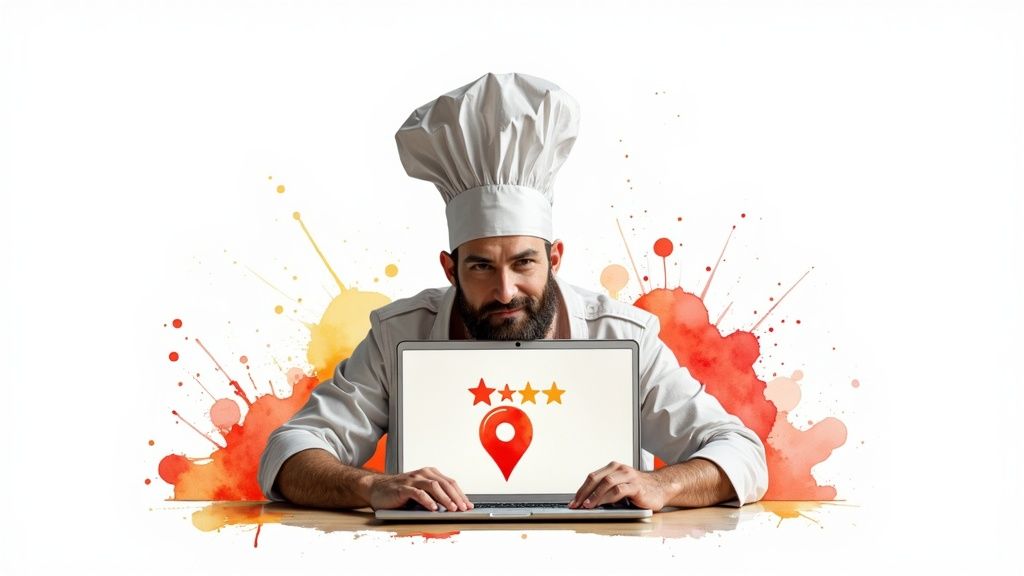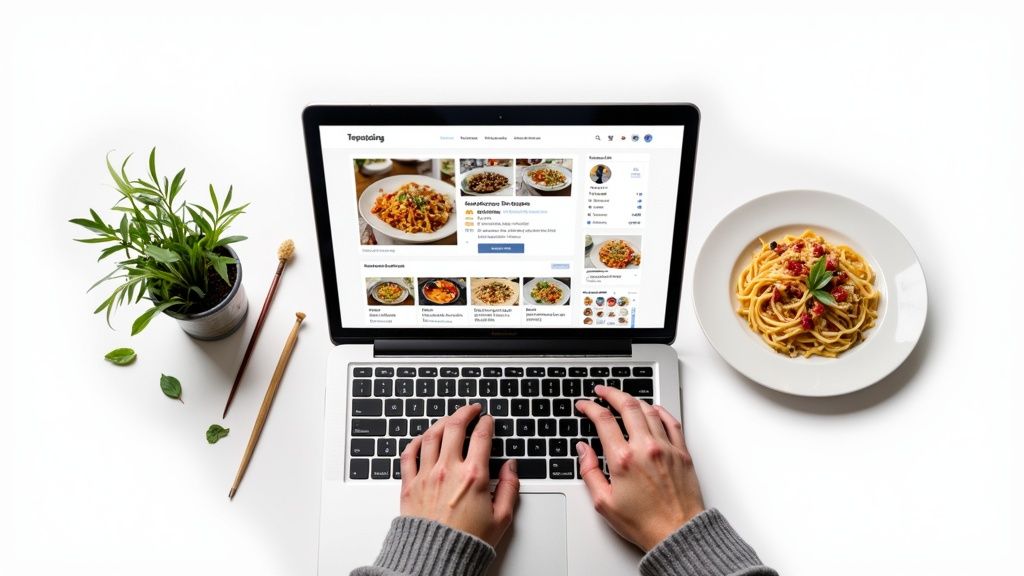Turn Yelp searches into guests with our guide on how to optimize your restaurant's profile and manage reviews

Yelp local SEO is the process of optimizing your restaurant's Yelp profile to show up higher in local searches—both on Yelp and Google. It involves completing your profile, using the right keywords, getting good reviews, and using Yelp's tools to attract nearby customers.
Between managing inventory and kitchen chaos, it's easy to push Yelp to the bottom of your to-do list. But that’s a mistake. Yelp is a powerful tool for bringing in customers who are deciding where to eat right now. For diners, it's a go-to for quick decisions.
Data shows that claiming and polishing up a Yelp page can boost a restaurant's revenue by 5% to 10%. A strong profile turns a casual browser into a dinner reservation.
Think of Yelp as digital foot traffic. When someone in your neighborhood searches for "tacos near me," a well-optimized Yelp profile puts you front and center. Ignoring it is like locking your doors during the dinner rush.
Yelp's influence extends to Google, too. Because it’s a high-authority site, your Yelp page often ranks on the first page of Google searches for your restaurant's name, making it a critical piece of your online reputation and your overall digital marketing strategies for restaurants.

Your Yelp page is your digital front door. It’s often the first impression a potential customer gets. First, you must claim your business page on Yelp. It's free and gives you full control. An unclaimed page looks neglected and can spread misinformation.
Once claimed, complete every single field. This simple act signals to Yelp's algorithm that you're an active, legitimate business deserving a better spot in search results.
Accuracy is non-negotiable. A wrong phone number or address is a lost customer.
Categories are a powerful tool for Yelp local SEO. They control which searches you appear in. Don't just list "Restaurant." Get specific.
Are you a "Pizza Place," "Trattoria," or just "Italian"? Do you offer "Brunch," "Tacos," or "Seafood"? Select every category that applies. A customer searching for "best brunch spot" will never find you if you're only listed as a generic diner.
Don't neglect the "From the Business" section. This is your chance to tell your story. Talk about your chef's passion for local ingredients or the history behind your recipes. As you write, weave in keywords naturally—mention your cuisine types or neighborhood. This gives Yelp more context, strengthening your relevance in local searches.
With your profile claimed, the real work begins. To get to the top of Yelp searches, you must actively manage your page. Yelp's algorithm favors the most complete, accurate, and appealing option. Your job is to make your profile that obvious choice.
Keywords are the terms people use in the search bar, like "patio dining" or "kid-friendly restaurant." Sprinkle these naturally throughout your profile.
This isn't about stuffing keywords; it's about being descriptive. For more on this, see our guide to local SEO for restaurants.
Yelp Attributes are critical. These are tags like "Takes Reservations" or "Outdoor Seating." Customers use these filters to narrow their options. If you haven't selected the right attributes, you won't show up. Go through the list in your Yelp for Business dashboard and check every one that applies. It's a five-minute task that can instantly put you in front of more diners.
An outdated menu is also a red flag for customers and Yelp. Keep it current, especially with seasonal items or price changes. This signals you're actively managing your page. Connecting online ordering or reservation tools also helps, as Yelp rewards businesses that create a smooth customer experience. Recent Yelp's AI-powered local search enhancements show their commitment to a seamless user journey.

Reviews are the pulse of your Yelp profile. They often decide whether a diner books a table or keeps scrolling. Managing them isn't just damage control; it's building a public conversation that shows you care about great food and service.
Yelp prohibits directly asking for or incentivizing reviews. Don't do it. But you can and should nudge customers in the right direction.
Responding to reviews is no longer optional. It shows every customer that you're paying attention.
For Positive Reviews: Don't just say "Thanks!" Get personal. Mention something from their review: "We're thrilled you loved the wild mushroom risotto—it's a kitchen favorite!" This makes the reviewer feel heard.
For Negative Reviews: A calm, professional response can do more for your reputation than a dozen five-star reviews.
A thoughtful response tells potential diners that even when things go wrong, you take ownership. That builds long-term loyalty.
Getting results from Yelp doesn't require a big ad budget. The key is to maximize the free tools Yelp provides before even considering paid ads.
Your Yelp for Business dashboard is a goldmine of data. Dive into your analytics to see user demographics, popular viewing times, and the actions they take. This is direct feedback on what's working, helping you make smarter decisions. For a deeper dive, check out our complete guide to local SEO for restaurants.
Yelp Ads can be useful in specific situations, but they aren't a magic bullet. Consider a small ad spend if you need to promote a high-margin special, drive traffic on a slow night, or get initial visibility for a new opening. Start small, set clear goals, and track your return on investment. Always optimize your free profile first.
Here are straight answers to common questions about making Yelp local SEO work.
This isn't an overnight fix. While some updates are instant, seeing a real jump in search ranking can take a few weeks to a couple of months. Consistent activity, like getting and responding to new reviews, is what moves the needle.
Quick Win: The fastest way to get a visibility boost is to fill out every single field on your profile and upload at least 10 high-quality photos. This signals to Yelp that you're an active business.
It depends. For a new spot or a specific promotion, they can be a smart investment. But ads should not be your first move. Perfect your free profile first to get the best long-term return. If you do use ads, start with a small budget and track the results closely.
It’s extremely difficult. Yelp only removes reviews that clearly violate their content guidelines, such as hate speech or harassment. They will not remove a review just because it’s negative.
Instead of fighting for removal, focus on your public response. A calm, professional reply shows every other potential customer that you take service seriously. Handled well, a negative review can actually improve your reputation.
Ready to connect your online presence with your in-house operations? Peppr Grow builds powerful websites with commission-free online ordering that work seamlessly with your POS, turning Yelp browsers into loyal customers. See how Peppr can streamline your business.
